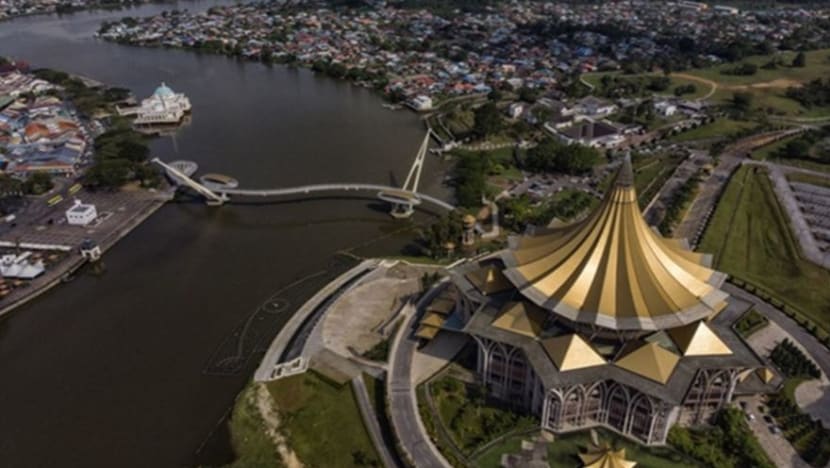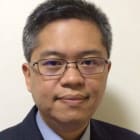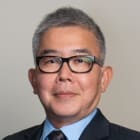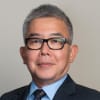Commentary: Sarawak offers Malaysia lessons in managing diversity
Sarawak’s unity and harmony stands in marked contrast to the politicised race and religion on the Peninsula, say ISEAS-Yusok Ishak Institute’s Norshahril Saat and Lee Poh Onn.

The Sarawak State Legislative Assembly building in Kuching. (File photo: Bernama)
SINGAPORE: Observers of Malaysia often note that the ruling elites politicise race and religion, but Sarawak's politicians and civil society have stepped forth to defend their East Malaysian state’s contrasting multiculturalism and diversity.
Sarawakians have always considered themselves to be a model for unity and harmony. Moreover, they view with trepidation how race and religion are handled in Peninsular Malaysia (or West Malaysia).
Not that the state is immune from such issues spilling over. On Mar 31, a KK Mart convenience store in Kuching witnessed a Molotov attack over the “Allah socks” issue, following similar incidents on the Peninsula. The Sarawak government acted swiftly and decisively to condemn the act and reiterate the state’s distinctiveness.
The attack was very “un-Sarawakian”, said State Deputy Public Health, Housing and Local Government Minister Michael Tiang, who also condemned it as unacceptable and tantamount to a challenge of Sarawak’s core values, culture and harmony.
Abdul Karim Rahman Hamzah, Tourism, Creative Industry and Performing Arts Minister in Sarawak, urged the UMNO (United Malays National Organisation) Youth chief Muhamad Akmal Saleh to stop inciting people over this issue.
SARAWAK'S APPROACH TO RELIGION
Sarawak’s demographic makeup renders Ketuanan Melayu (Malay supremacy) and Ketuanan Islam (Dominant Islam) conceptually foreign and politically controversial. In Sarawak, the Malay-Melanau grouping of sub-ethnic categories constitutes the bulk of Sarawak’s Muslim population, accounting for 30 per cent of Sarawak’s total population.
However, Malay-Melanaus have held disproportionate political power, including the chief minister position, for decades. The Dayak grouping of other indigenous and mainly Christian sub-ethnicities comprises about 45 per cent of Sarawakians, with Chinese at 24 per cent. Sarawak is ruled by a coalition of state-based parties under the Gabungan Parti Sarawak (Sarawak Parties Alliance) banner; its state Cabinet consists predominantly of ethnic Malay-Melanau (Muslim indigenous), Dayak (non-Muslim indigenous), and Chinese party leaders.
Ethnic Malays in Sarawak, who are proud to uphold a more tolerant version of Islam, do not see Peninsular Malays as their brethren. Demographic composition partly explains this, but the state has also adopted its own approach to overseeing religion.
It is not widely known that, on May 14, 1991, Sarawak became Malaysia’s first state to introduce a complete set of Syariah laws, including ordinances on criminal and civil procedures, criminal offences and family law.
However, as Sarawak premier Abang Johari has continued to emphasise, Sarawak is a multi-religious and multi-racial state that would protect "the rights and interest of everyone ... based on the five ‘Maqasid Syariah’ principles which include the protection of life, property, health, religion and dignity".
In Sarawak, Syariah is also guided by inclusive principles, and there is no mention of hudud laws, which include punishments such as amputation, stoning, and whipping.
The “Sarawak Formula” for maintaining harmony and managing diversity can be attributed to a solid tripartite response between the Sarawak government, religious elites, and civil society.
Sarawak political leaders, especially the chief minister, are the pillars of Sarawak’s defence against exclusivism. The decades-long trend of the chief minister coming from a minority group underscores the salience of communal tolerance in the state’s politics.
Sarawakians are perhaps also enabled to maintain their progressive stances in the context of Muslim-dominant neighbours on the island of Borneo, such as Pontianak (West Kalimantan), Brunei, and Samarinda (East Kalimantan) - which present varying modes of inclusion and exclusion.
In a way, Sarawak’s tolerance and celebration of diversity are akin to Pontianak - which harmoniously houses Chinese and Dayak minorities - but different from Brunei, a homogeneous Malay/Muslim Sultanate. Whereas Islamisation prevails in Brunei in a similar fashion to Peninsula Malaysia, this has not penetrated Sarawak.
STRONG RELIGIOUS, CIVIL AND SOCIAL SUPPORT
The Sarawak government actively supports religions besides Islam through its Unit for Other Religions (UNIFOR) established on Apr 27, 2017. The establishment of UNIFOR was the brainchild of former Sarawak chief minister Adenan Satem and is now under Sarawak premier Abang Johari’s office.
Through UNIFOR, an inclusive approach is adopted for all religions to safeguard religious harmony and look after the needs of other religions besides Islam. UNIFOR has disbursed more than RM400 million (US$85 million) since its inception, supporting Sarawak’s diverse religious communities including the various denominational Christian churches, and Taoist, Buddhist, Sikh, and Hindu temples/places of worship which have all received funding for their projects.
Sarawak’s government has also permitted churches to freely use the term Allah in their worship and publications, contrary to the ban on such practices in Peninsular Malaysia, demonstrating the important role of leadership in ensuring racial and religious harmony in the state. Of course, disagreements arise but these have generally been resolved in an uncontentious manner.
The growing resistance towards exclusivist and conservative Islamisation could not work without strong support from the religious establishment and civil society. Like the other states in Malaysia, the Sarawak Islamic Religious Council, a powerful body with the right to issue edicts (fatwa), can enforce their rulings published in the state gazette. As Sarawak does not have a Malay ruler, according to Malaysia’s constitution, the King functions as the state’s head of Islam.
Yet, the religious elites have been able to chart Sarawak’s autonomous path. For instance, the Sarawak religious council did not enforce the national fatwa committee’s ruling to restrict the use of the term Allah for Muslims only and was neutral about the politically sensitive issue of Muslims converting out of Islam.
Lastly, Sarawak society’s contribution to harmony must not be discounted. Sarawakian Muslims have never lobbied the state to follow the route undertaken by their fellow believers on the Peninsular. Rather, they are proactive in fostering dialogue to circumvent differences and in defending diversity.
Immediately after the KK Mart attacks, 45 youths from Islam, Christian, and Buddhist organisations got together to form the Interfaith Youth Alliance, with significant East Malaysian participation.
Sarawak’s experience in maintaining peace when dealing with differences should be the gold standard for Malaysia. Interfaith harmony should not remain as slogans such as Islam Madani (Prime Minster Anwar Ibrahim), Hadhari (former prime minister Abdullah Badawi) or One Malaysia (former prime minister Najib Razak), but should be fostered through day-to-day practices.
As the KK Mart incidents demonstrate, this harmony must not be taken for granted; exclusivist forces are slowly creeping into the state.
Norshahril Saat is a Senior Fellow and Coordinator at the Regional Social & Cultural Studies Programme, ISEAS – Yusof Ishak Institute. Lee Poh Onn is a Senior Fellow with the Regional Economic Studies Programme and Malaysia Studies Programme, ISEAS – Yusof Ishak Institute. This commentary first appeared on ISEAS – Yusof Ishak Institute’s blog, Fulcrum.






















